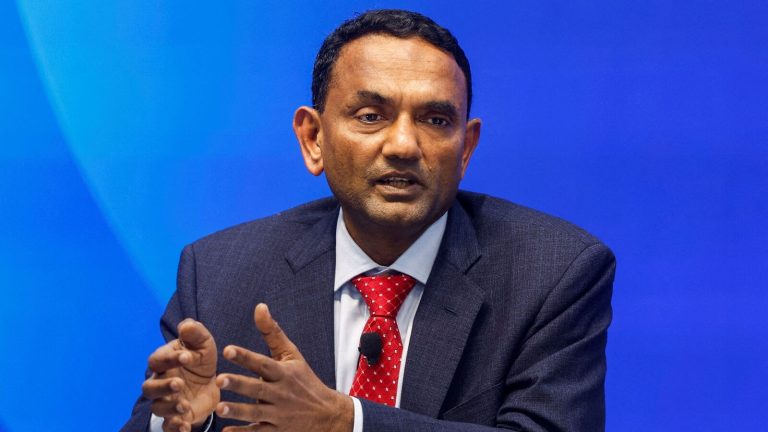Significantly, the Mumbai-based company said that spending on Gen AI-related projects is in addition to the outsourcing budgets, which should assuage investors’ concerns about whether the new technology was leading Fortune 500 companies to slash their tech spending.
“Depending on the kind of programme, we share the productivity gains with customers,” said K. Krithivasan, chief executive officer of TCS, in an interview on Friday. “So yes, there is a net revenue reduction. (But) Clients see the savings and give more (volume of) work. So TCS remains in a very strong position.”
“Leveraging AI, we are willing to cannibalise. Sometimes willingness to cannibalise is a strength,” said Krithivasan.
Homegrown IT services firms’ current model involves deploying an army of engineers to do mundane and commoditized work. Under the billing model, more engineers translate to more money.
The rise of Gen AI implies that intelligent algorithms, fed with data on companies’ internal processes, can do the repetitive work. Using more Gen AI tools helps clients save on costs and generates less revenue for firms like TCS.
According to Krithivasan, this predicament about whether to let go of some business is not a concern.
“AI creates a need to create more software. So, while the cost of writing a unit of code may come down, the overall pie (of work) will increase. This is our assumption,” said Krithivasan, who took over as the boss in June 2023.
Impact of GenAI on business
“So far, we have not heard from our customers that this is the saving from Gen AI, and I will only plough back so much. The spending does not come only from the CIO (chief information officer) but also from CMOs and other CXOs inside companies. All this is new money. So at the enterprise level, we believe that it (GenAI) will be more accretive and not deflationary,” said Krithivasan when asked about the impact of GenAI on TCS’s business in the next 12-24 months.
The country’s $283 billion IT services industry faces two challenges. First is the structural risk posed by the rise of GenAI adoption. Additionally, macroeconomic uncertainty, primarily because of the US administration’s flip-flop on tariffs, comes with the risk of a global economic slowdown.
That will be bad news.
Last week, TCS reported its fourth-quarter and full-year earnings, which were hobbled by macroeconomic uncertainty. Management said they have seen some companies in the auto and retail sector defer starting new tech projects.
TCS reported 3.8% revenue growth to end the year with $30.18 billion in revenue. Profitability slipped 30 basis points to 24.3%.
TCS and its smaller peers like Infosys Ltd and HCL Technologies Ltd do not quantify related to Gen AI, including revenue or orders. In contrast, Accenture Plc, which follows a September-August fiscal year, secured Gen AI bookings worth $1.4 billion or 6.7% of order book in the quarter-ended February 2024. In the same quarter, Accenture got revenues of $600 million from Gen AI projects. Since September 2023, when Accenture first started sharing metrics on GenAI, the company has won $5.6 billion in orders in GenAI.
Tech disruption
For this reason, a few analysts have questioned how the Big Five of Indian IT will win in this wave of technology disruption.
“Inherently, new technologies tend to be deflationary, a headwind for incumbents and an opportunity for challengers. Additionally, the difference in technology expertise (skill + scale) narrows down in new technologies aiding challengers. It will be difficult for TCS to aggressively incorporate gen AI into its services portfolio, given the larger size relative to challengers who can better afford to cannibalize existing revenue to get a bigger portion of the pie from incumbents,” Kawaljeet Saluja, Sathishkumar S., and Vamshi Krishna wrote in a note dated 11 April.
“TCS is experiencing incremental traction in genAI deals, according to management. Moreover, on the supply side, TCS indicated AI is not hurting or replacing traditional headcount growth and increased proportions of hiring are for AI-led opportunities,” Keith Bachman wrote in a note dated 10 April.
“I’m confident that the uncertainty will be short-lived,” said Krithivasan, reaffirming that he expects TCS to grow faster in the current fiscal than last year.
Key takeaways
- TCS CEO K. Krithivasan acknowledges that sharing productivity gains from GenAI with clients leads to some reduction in existing revenue streams but frames this “willingness to cannibalise” as a strategic strength, believing clients will reinvest savings into more work.
- TCS asserts that client spending on GenAI projects is in addition to their existing IT outsourcing budgets, countering fears that GenAI adoption is simply leading to cuts in overall tech spending.
- The company operates on the assumption that while GenAI might reduce the cost of individual tasks, it will ultimately spur demand for more software and technology solutions, increasing the total volume of work available.
- Despite the complexities, TCS anticipates that GenAI will ultimately add to its business rather than reduce it over the next 12-24 months, citing new spending from various business units within client companies.
- TCS faces macroeconomic headwinds and differing analyst opinions. While TCS is optimistic, some analysts question whether large incumbents can aggressively adopt GenAI without disrupting their core business.


